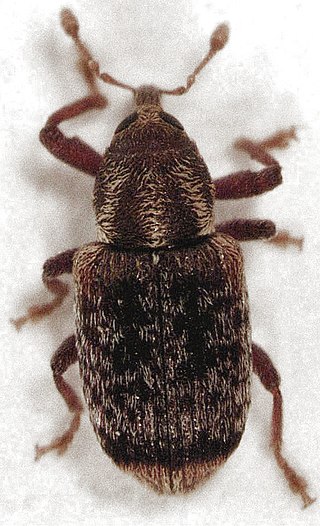
Peristoreus is a weevil genus native to New Zealand. This genus was first described in 1877 by Theodor Franz Wilhelm Kirsch.
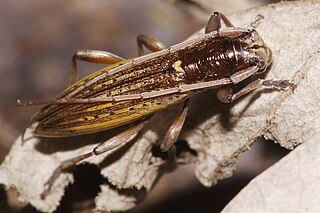
Xylotoles is a genus of flat-faced longhorns in the beetle family Cerambycidae. There are more than 15 described species in Xylotoles found mainly in New Zealand, Australia, and surrounding islands.

Mecodema is a genus of large flightless ground beetle (Carabidae) endemic to New Zealand. The genus is very diverse in comparison to the other three New Zealand genera within the subtribe Nothobroscina. Mecodema is geographically widespread across both the North and South Islands, as well as numerous offshore islands, including the Three Kings Is., Poor Knights Is., Aotea and Hauturu, Kapiti Is., Stephens Is., Stewart Is., Chatham Is., Snares Is.
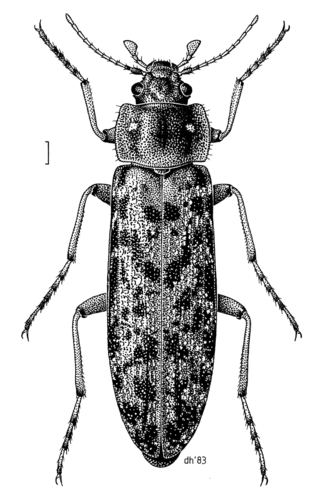
The Chalcodryidae are a family of beetles in the superfamily Tenebrionoidea. It contains at least five species in two genera Chalcodrya and Philpottia, which are endemic to New Zealand. They are generally found associated with moss or lichen covered branches, with the larvae having been found to be associated with dead twigs. They are likely noctural, feeding on lichen and other plant material at night. The genera Sirrhas and Onysius, formerly placed in this family, have subsequently been transferred to Promecheilidae.

Gaioxenus is a genus of beetles in the family Carabidae. Gaioxenus pilipalpis is the only species in the genus. This genus and species was first described by Thomas Broun in 1910. Broun based the descriptions on specimens he collected in Raurimu in the Manawatū-Whanganui region of New Zealand. Gaioxenus pilipalpis is endemic to New Zealand.
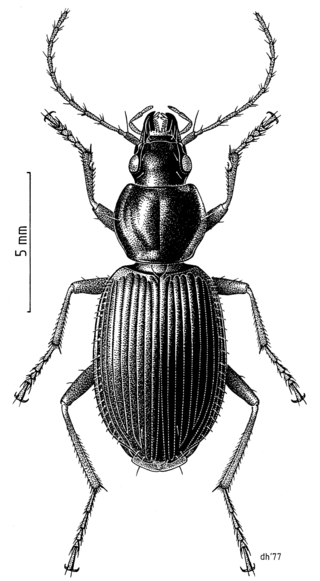
Ctenognathus is a genus of beetles in the family Carabidae. This genus is endemic to New Zealand. It was first described by Léon Fairmaire in 1843.

Aulacopodus is a genus of beetles in the family Carabidae, containing the following species:

Holcaspis is a genus of beetles in the family Carabidae, endemic to New Zealand.

Megadromus is a genus in the beetle family Carabidae. There are at least 30 described species in Megadromus, found in New Zealand.

Zeopoecilus is a genus of beetles in the family Carabidae, containing the following species:

Nesamblyops is a genus of beetles in the family Carabidae, containing the following species:

Oopterus is a genus in the beetle family Carabidae. There are more than 20 described species in Oopterus, found in New Zealand.

Enicmus is a genus of beetles in the family Latridiidae, the minute brown scavenger beetles.
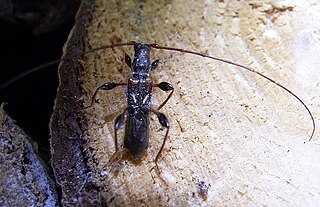
Molorchini is a tribe of beetles in the subfamily Cerambycinae, containing the following genera:

Mitophyllus is a genus of large stag beetles endemic to New Zealand.
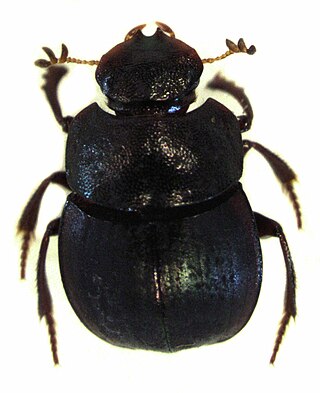
Saphobius is a genus of dung beetles in the tribe Deltochilini of the subfamily Scarabaeinae. They are endemic to New Zealand, with Saphobius edwardsi being most widespread. They are small in size, flightless, forest dwelling and nocturnal, which is unusual for dung beetles.

Eucolaspis is a genus of leaf beetles in the subfamily Eumolpinae. It is native to New Zealand, where it is a serious pest of apple trees and other fruit crops. The genus has also been reported from Fiji.

Brachyolus is a genus of broad-nosed weevil in the family Curculionidae.

Adoxia is a genus of skeletonizing leaf beetles in the family Chrysomelidae. There are more than 60 described species in Adoxia, found in Australia and New Zealand.
Parepierus is a genus of beetles.



















